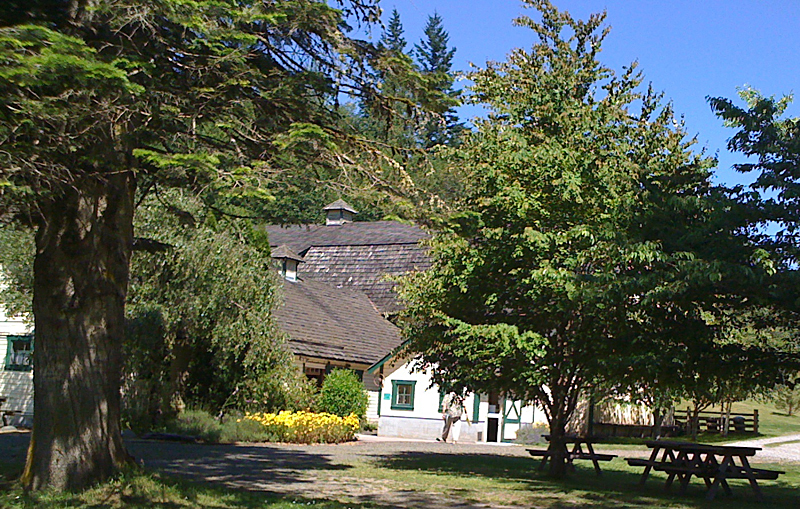The grounds of the Olympic Music Festival, outside Quilcene on the peninsula it’s named for, was once a small dairy farm. It’s been refurbished into what looks like a sort of summer camp for adults—by Martha Stewart, judging by the rusted wagon wheel leaning just so against a weathered wooden fence. A gravel drive separates two lawns, one dotted with shade trees, both furnished with picnic tables. Regulars come prepared with sun hats (one sports a parasol) and come early to lunch; one tableful of serious picnickers drinks wine in glass stemware and brought a vase of flowers as a centerpiece. If you come via the Edmonds ferry, there’s a convenient IGA in Kingston for stocking up on picnic food and drink. (Or you can approach via the Bainbridge or Bremerton ferries; all routes lead to Kitsap and the Hood Canal Bridge.)
The concert barn and other buildings are pale yellow with a dark-green trim. A large anteroom (a waiting area in bad weather) leads to the barn and offers snacks, beer, and wine, plus enough OMF-logoed swag to outfit a decade of PBS pledge weeks: posters, CDs, tote bags, sweatshirts, fleeces, hats, tank tops, and T-shirts in a dozen colors. Outside the door hangs a triangle, which, like Chekhov’s gun, must be and is used to signal the start of the concert.
The barn itself is, yes, literally a barn. At one end, a dais about a foot and a half high holds a grand piano; a partitioned area off to the side serves as a green room. At the other is a hayloft furnished like a theater balcony with tiers of hay bales. More bales, stacked four high, line the sides of the main floor, which is filled with folding chairs and repurposed church pews. The open barn door looks out on a sloping lawn—the cheap seats, if you will, since each concert is broadcast outside. At the top of the slope—another Martha touch—a defunct tractor stands sentinel. A few dozen blankets and lawn chairs are scattered in the shady and sunny patches, bearing nappers, more picnickers, and a few children scurrying on the grass. The median age for attendees is AARP; the hip-replacement demo will appreciate guaranteed advance seating in the barn.
From the lawn, you can see into the side of the barn, but not the musicians, who play at one end. On the other hand, from inside the barn, you can’t watch the eagles wheeling high overhead. Outside, the music mingles with the sounds of passing horses, a distant cock’s crow, and the swallows that live under the barn eaves. (Less romantic are occasional airplane noises and the air-brakes of passing trucks, undetectable from inside.)
Around Puget Sound, summer classical-music festivals come and go; I can think of three in the past decade-plus that have popped up, offered tantalizing programming, then vanished. But the OMF, in its 28th season, flourishes. Executive director Alan Iglitzin founded it as a summer home for the Philadelphia String Quartet, then in residence at UW. The Festival outlived the Quartet, but violist Iglitzin continues to perform frequently. The repertory—mostly Mozart through Debussy, plus a sprinkling of 20th-century Russians—is highly conservative but undeniably beguiling in the bucolic setting.
On the weekend I visit, it’s a Mozart duo, Brahms’ Horn Trio, and a handful of salon songs from personable tenor Daniel Montenegro. The top row of side bales turns out to be a fine vantage point, like an opera box, and there’s a wonderful cross-breeze. The acoustics are near-ideal, though no retrofitting is in evidence; they took the barn as it was and got lucky. The atmosphere is casual, of course—this is a tux-free zone, with the musicians in polo shirts and chinos, and there’s plenty of chat between pieces.
Among all the classical-music world’s recent worries about aging and shrinking audiences and talk of goosing the concert experience, one popular fix has been the concept of added value: making concerts a social activity beyond the sit-and-listen part. But the OMF got there decades ago, hitting on a road-trip/afternoon-in-the-park formula that remains not only successful but unique in the Northwest.
* Concert Cuisine: Program highlights for the OMF’s remaining weekends, with suggested picnic fare
August 13–14 For Poulenc’s defiantly dashing 1943 Violin Sonata: a wheel of very ripe Camembert, your last six bottles of Champagne (drink it all before the Germans get it!), and a baguette heated over a camping stove.
August 20–21 For Shostakovich’s bleak 1940 Piano Quintet: a hunk of cheap red caviar, the darkest rye bread you can find (crusts only), and bad vodka in a hip flask (no one checks for contraband).
August 27–28 For Brahms’ luscious String Quintet in G: Wiener schnitzel, apfelstrudel, Sachertorte, and Gewürztraminer. Wearing lederhosen is strongly encouraged.
September 3–4 For Stravinsky’s primitivist Rite of Spring: an animal leg half-cooked over an open fire (no utensils allowed). Dance naked if you wish.







